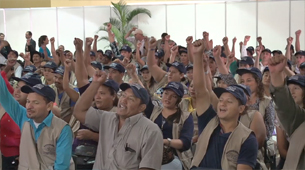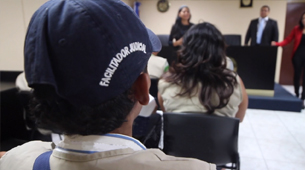- English
- Español
Media Center
Feature
The Inter-American Program of Judicial Facilitators (IPJF) of the OAS improves access to justice for millions of citizens of the Americas.
Community leaders trained through the Program act as mediators and conciliators and reduce the workload and costs of the formal legal system.
Facilitators solve many cases more quickly and at lower costs than the courts.
April 20, 2016
For Roque López Mejía, a judicial facilitator in La Virtud, a municipality near the border between El Salvador and Honduras, there is one incident in his community that illustrates more than any other the benefit of the Inter-American Program of Judicial Facilitators of the Organization of American States (OAS). A man accused his neighbor of having moved the fence that divides their land where they raise livestock. “The man reacted angrily,” recalls López Mejía, “and he said that if anyone moved the posts someone was going to die.”
The municipality of La Virtud in Honduras is one of the most remote areas of the country and, for its inhabitants, access to a judge would mean a long journey and days of lost work. However, the presence of López Mejía, a judicial facilitator trained by the country’s legal authorities, helped resolve the dispute within the same community. In the end, with his intervention, the neighbors got together to talk, marked their land while reviewing the documents, and reached an agreement without violence.
Facilitating Justice and Saving Resources

The OAS Program of Judicial Facilitators - supported by The Netherlands, Spain, Italy and Sweden - has been implemented in eight countries (Guatemala, El Salvador, Honduras, Nicaragua, Costa Rica, Panama, Paraguay, and Argentina), includes 11,400 facilitators and serves approximately 5.5 million people in the Americas. “The judicial facilitators’ service is a bridge between legal institutions and the population,” explains the Coordinator of the Program, Pedro Vuskovic.
However, judicial facilitators not only improve access to justice, but also lower its costs. That is the conclusion of a new study carried out consultants with the support of the judicial bodies of Central America, public universities and the Program. The Study on the Economic Impact on Victims in Conflict Resolutions in Central America reveals that for each dollar spent by a victim who goes to a facilitator, $290 are spent by those who choose to go through a judicial process.
Likewise, according to the study, those who go through a facilitator reach a resolution sooner. The report highlights that it takes one hundred times longer to resolve a case through the courts than through mediation with a judicial facilitator; to obtain a judgment takes in some cases more than two years while it takes on average only one day when the mediation is conducted by a facilitator.
Part of the Essence of the Justice System
For Honduran Magistrate Nora Yessenia Recinos, the benefits of the Program go far beyond savings. “In my opinion, the service has brought two important elements: first, access to justice as it has meant communities don’t have to bring small cases to my court; and second, it provides support, and has reduced my workload.”
Carmen Orantes de Lara, a Magistrate in El Salvador, adds that “the figure of the judicial facilitator is not an addition to the justice system; it is part of its very essence. In this regard, judicial facilitators here in the community are part of the holistic structure of the court.”
“I enjoy working for the community”
Roque’s commitment to mediation and peace can be seen on his face, literally. He bears two scars across his cheeks from attempting to stop a fight years ago. Today, after two years as a facilitator—in the few free hours that his occupation growing corn and beans leaves him—his passion for assuming that responsibility has not diminished. “Sometimes, when you work as a judicial facilitator you can even save lives, and that’s why you feel enthusiastic and want to continue working,” he says.
And in the future? “I may never stop working as a judicial facilitator,” Roque concludes, “because I like to work for the welfare of the community. In order to live in peace, I enjoy working to ensure there are no problems in our communities.”
Reference: E-046/16



